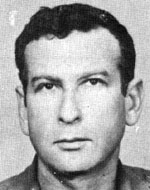Yairi, Uzi
Son of Baruch and Haviva. He was born on July 31, 1936 in Ramat Gan. In 1938 the family was sent by the Haganah to live in the Moledet neighborhood of eastern Holon. When Uzi became six years old, he went to the Alliance School in Tel Aviv every day. Over time he went to study at the Bilu School because they learned more Hebrew there. At the beginning of the War of Independence, Uzi went to study at Gordon Elementary School in Holon. Continued at the ORT school in Jaffa. After completing his high school studies in political science and economics at the Hebrew University in Jerusalem, Uzi was drafted into the IDF in March 1955 and volunteered for the Nahal Brigade, He also moved to the parachuted Nahal Brigade and served in a unit commanded by Gur Gur. Thanks to his talents and far-reaching ambitions, he rose very quickly in the command stages. He completed an officers’ course while taking part in many retaliation and battles. During the Six-Day War, Uzi was the commander of a reconnaissance unit with the rank of major and commanded many important operations of the commando unit. His desire for advanced training and specialization in other areas was enormous. In 1969, he and his family moved to the United States and completed the US Army Command and Staff School. Upon his return to Israel in 1970, he was appointed deputy commander of the Paratroopers Brigade. He was appointed as the chief of staff of the then Chief of Staff, Haim Bar-Lev, and was appointed Commander of the Paratroopers Brigade after completing his duties in order to learn the operational aspects of his position. At the height of the Yom Kippur War, Uzi was the commander of the Paratroopers Brigade, which fought fierce battles in the Chinese coastal area, and ordered Uzi to clear one of the traffic arteries leading to the bridgehead, which was supposed to flow supplies, reinforcements, and bridging equipment. After the war he was transferred to positions in the headquarters of the Chief Paratroopers and the Intelligence Corps , And assisted him in recovering from the difficult crisis he experienced during the war.Uzzi took part in several operations across the border against the terrorist forces, including the Beirut operation that led to the killing of three of the leaders of the terrorist organizations and the operation of the terrorist base in the Tripoli area of Lebanon. On February 6, 1975, Colonel Uzi fell in a battle at the Savoy Hotel in Tel Aviv, but was not supposed to take part in the operation against the ropes that broke into the hotel, but when he arrived in his capacity as intelligence officer he took up arms and joined the two cells that infiltrated the building And that many of their soldiers knew very well that they were his former subordinates. He was hit by a bullet fired at him in the corridor while he was cleaning the hotel rooms. Later he died of his wounds. He was laid to rest in the military cemetery in Kiryat Shaul. He left behind a wife, five sons and daughters and two parents. After his death, much was written about his work in the Israeli press. “He was a wonderful conversationalist, with original ideas, analytical ability and comprehensive intelligence, a friend and a friend, and, above all, his honesty, his honesty, his honesty and his honesty were the most important thing in the IDF. Uzi Yairi was also a poet and cantor for the time being and wrote ‘nonsense songs’ to internal parties of the paratroopers. Some of his songs became paratroopers’ assets in the past, and despite his feeling after the Yom Kippur War, he prepared several songs for the paratroopers. “With his great loyalty to the IDF, Uzi was an exemplary family and maintained close ties with his wife and five sons and daughters. Articles about his life and military activities also appeared in the Israel Security Lexicon and in a book in memory of the people of Ramat Hasharon who fell in Israel.In a letter of condolence to the bereaved family, the then chief of staff, Lieutenant General Mordechai Gur, wrote: “Uzi’s ability and courage to look inside, into the depths of intellect and emotion, were rare and made him an exemplary figure for his subordinates. With the fall of Uzi, we lost one of the main criteria for examining ourselves. Even in the way Uzi fell, he left behind a heavy conscience struggle. His behavior has set a leading standard and we can only follow the path that has been dictated. If at the end of the family, Uzi served as a center as strong as he was in the IDF – I can not be comforted. “
